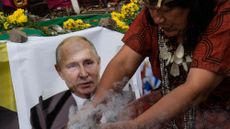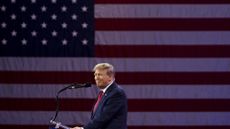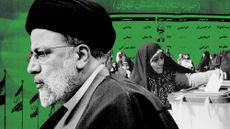The Trump-Kim summit should be hailed as a success
And Trump deserves all the credit

The ink is barely dry on the joint statement signed by President Trump and North Korean leader Kim Jong Un during Tuesday's summit in Singapore, and yet people are already dumping on it. This is no "deal," the critics say. It's just a vague press release rehashing talking points.
But on the whole, the meeting is an auspicious start.
A follow-up press conference announced some concrete steps: The U.S. would halt military exercises in South Korea, Kim apparently agreed not only to the principle of denuclearization, but to some sort of inspection regime, and Trump announced a follow-up meeting between Secretary of State Mike Pompeo and a North Korean counterpart. Still, there's no mention of a peace treaty — North Korea and the U.S. are still technically at war — or a deadline, or many other specifics.
Subscribe to The Week
Escape your echo chamber. Get the facts behind the news, plus analysis from multiple perspectives.

Sign up for The Week's Free Newsletters
From our morning news briefing to a weekly Good News Newsletter, get the best of The Week delivered directly to your inbox.
From our morning news briefing to a weekly Good News Newsletter, get the best of The Week delivered directly to your inbox.
But there was never any realistic expectation that a single meeting between two men could produce a comprehensive deal. For starters, a comprehensive deal would have to include China, Russia, and South Korea. And, of course, there will be details to be ironed out. President Ronald Reagan's historic Reykjavik summit with Mikhail Gorbachev — the obvious template for what Trump is trying to do with Kim — happened in 1986, and the resulting Intermediate-Range Nuclear Forces Treaty only happened in 1987.
The point of such summits is not to come out with a full treaty neatly packaged and tied with a bow. It is to build rapport between leaders — which matters enormously — and get a sense of each side's red lines, which will form the outlines of a future deal.
Right now, there is so much we don't know. Trump will say anything. Kim is also a complete mystery. Perhaps, being from a different generation and having been exposed to the outside world before joining the family business, Kim has a genuine desire to open up his country, if only because it would make him much richer and enable him to travel a lot more. Or perhaps he is just dangling the possibility of a comprehensive deal in front of an all-too-gullible U.S. president to get short-term relief on aid and trade, with no intention of actually denuclearizing, a game that his father was quite adept at. Your guess is as good as mine. Besides, every single international summit ends with the parties pretending it's been a big success, regardless of the actual contents.
With all those caveats duly noted, it certainly seems like the summit's goals have been accomplished. Trump and Kim do seem to have built real rapport, and the peace process with North Korea seems more alive now than at any point since the 1990s. If Kim's desire to reach a settlement is genuine, and if Trump manages not to screw it up, a good deal could be in sight. I agree those are very big ifs, but every international negotiation of consequence includes very large ifs, and that was true before Trump. In other words, there's reason to be cautiously optimistic. Given what could be realistically accomplished in one day, it's hard not to think that if anybody other than Trump were president, the summit would immediately have been hailed a preliminary success.
And really, credit needs to be given where it's due. It does seem like it was Trump's contempt for conventional thinking, and his dealmaking instincts, that got us here. The official U.S. policy was to refuse these kinds of meetings unless there were major concessions from the North Koreans, as these would grant North Korea "legitimacy." That policy seems to have simply alienated North Korea's leadership. Thinking like a real estate developer, Trump understood that giving Kim a photo-op costs him nothing. Besides, such "legitimacy" matters little for a regime that, domestically, controls all of its media and can therefore manufacture it at will, and internationally has pretty clearly accepted its rogue status. Simple-mindedness can be destructive, but it can also mean you see the forest for the trees. Trump blithely cut to the heart of the issue at hand: Does Kim want normalization badly enough that he's willing to give up his nukes?
It looks like Trump is well on his way to finding out the answer to that question. And whatever the outcome, we should all be grateful for it.
Sign up for Today's Best Articles in your inbox
A free daily email with the biggest news stories of the day – and the best features from TheWeek.com
Pascal-Emmanuel Gobry is a writer and fellow at the Ethics and Public Policy Center. His writing has appeared at Forbes, The Atlantic, First Things, Commentary Magazine, The Daily Beast, The Federalist, Quartz, and other places. He lives in Paris with his beloved wife and daughter.
-
 Why India's medical schools are running low on bodies
Why India's medical schools are running low on bodiesUnder The Radar A shortage of cadavers to train on is forcing institutions to go digital
By Chas Newkey-Burden, The Week UK Published
-
 Magazine solutions - November 22, 2024
Magazine solutions - November 22, 2024Puzzles and Quizzes Issue - November 22, 2024
By The Week US Published
-
 Magazine printables - November 22, 2024
Magazine printables - November 22, 2024Puzzles and Quizzes Issue - November 22, 2024
By The Week US Published
-
 Has the Taliban banned women from speaking?
Has the Taliban banned women from speaking?Today's Big Question 'Rambling' message about 'bizarre' restriction joins series of recent decrees that amount to silencing of Afghanistan's women
By Harriet Marsden, The Week UK Published
-
 Cuba's energy crisis
Cuba's energy crisisThe Explainer Already beset by a host of issues, the island nation is struggling with nationwide blackouts
By Rebekah Evans, The Week UK Published
-
 Putin's fixation with shamans
Putin's fixation with shamansUnder the Radar Secretive Russian leader, said to be fascinated with occult and pagan rituals, allegedly asked for blessing over nuclear weapons
By Harriet Marsden, The Week UK Published
-
 Chimpanzees are dying of human diseases
Chimpanzees are dying of human diseasesUnder the radar Great apes are vulnerable to human pathogens thanks to genetic similarity, increased contact and no immunity
By Harriet Marsden, The Week UK Published
-
 Deaths of Jesse Baird and Luke Davies hang over Sydney's Mardi Gras
Deaths of Jesse Baird and Luke Davies hang over Sydney's Mardi GrasThe Explainer Police officer, the former partner of TV presenter victim, charged with two counts of murder after turning himself in
By Austin Chen, The Week UK Published
-
 Quiz of The Week: 24 February - 1 March
Quiz of The Week: 24 February - 1 MarchPuzzles and Quizzes Have you been paying attention to The Week's news?
By Sorcha Bradley, The Week UK Published
-
 Will mounting discontent affect Iran election?
Will mounting discontent affect Iran election?Today's Big Question Low turnout is expected in poll seen as crucial test for Tehran's leadership
By Sorcha Bradley, The Week UK Published
-
 Sweden clears final NATO hurdle with Hungary vote
Sweden clears final NATO hurdle with Hungary voteSpeed Read Hungary's parliament overwhelmingly approved Sweden's accession to NATO
By Peter Weber, The Week US Published